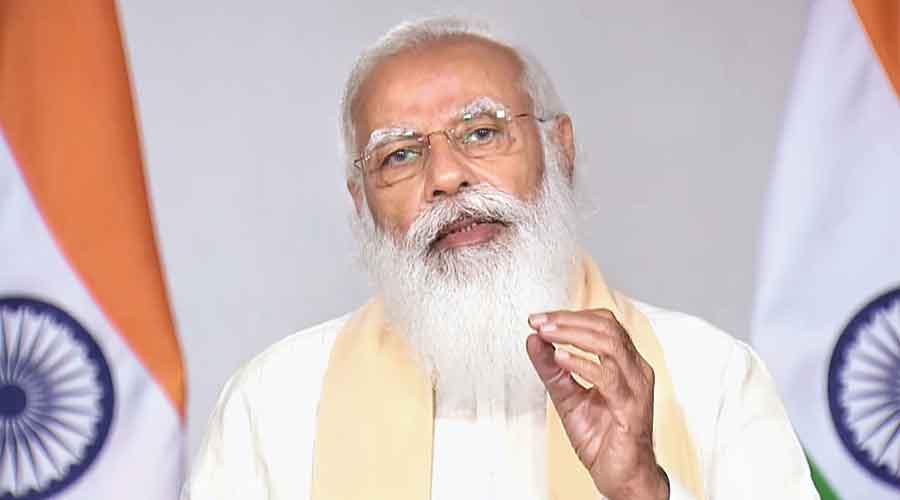On August 1, India assumed the presidency of the United Nations security council for the month and promptly got to work on setting the agenda with a focus on three major areas: maritime security, peacekeeping and counter-terrorism. India began its eighth two-year term as a non-permanent member of the UNSC on January 1; this is its first presidency during its 2021-2022 tenure. New Delhi clearly wants to leave a significant imprint of its presidency, as was underlined by the Union external affairs minister, S. Jaishankar, when he said that India will always be “a voice of moderation, an advocate of dialogue and a proponent of international law”.
Narendra Modi became the first Indian prime minister to preside over a meeting of the UNSC last week when he chaired the open debate on ‘Enhancing Maritime Security: A case for international cooperation’ via video conference. This reflected a new desire on the part of New Delhi to lead from the front on global governance issues. The message that went out was one of the commitment of India’s top political leadership to sustain and support the nation’s foreign policy ambitions. It was way back in 1992 that the then Indian prime minister, P.V. Narasimha Rao, had attended a meeting of the UNSC. New Delhi seems determined to make the most of its two-year tenure in the UNSC. This was reflected in the comments of the foreign secretary, Harsh Vardhan Shringla, in the run-up to India’s presidency: “We will leave our mark on the Council and our point is to say that India really, by its contribution, establishes the right to be a permanent member of the UN Security Council.”
The open debate gave India an important opportunity to highlight its role in bringing the international community together on a topic that is important not only for global stability but also for Indian interests. Under Modi’s chairmanship, the UNSC adopted the first-ever outcome document on maritime security which emphasized the importance of safeguarding the legitimate uses of the oceans while affirming the need to embed it in international law as reflected in the 1982 United Nations Convention on the Law of the Sea. Modi outlined five principles to develop a “framework of mutual understanding and cooperation” on maritime security which included free maritime trade, a joint fight against maritime threats from natural disasters and non-State actors, the preservation of the maritime environment, the promotion of responsible maritime connectivity and the peaceful settlement of maritime disputes in accordance with international laws. This was a push towards a more holistic and comprehensive approach to maritime security away from the piecemeal approach of the past. As the centre of gravity of global politics and economics shifts to the Indo-Pacific region, there is no denying the critical role of maritime security; the ability of nations, big and small, to harness its full potential remains a function of wider stability and peace in the maritime order. India’s growing role as a critical, nodal actor in the Indo-Pacific region makes it imperative to push this agenda on the global stage, in spite of the challenges from nations like China. India’s UNSC membership gives it that diplomatic heft, which New Delhi has done well to exploit.
The UNSC meeting was attended by several heads of state and senior UNSC members, including the Russian president, Vladimir Putin, and the secretary of state of the United States of America, Antony Blinken. The latter highlighted India’s leading role in maritime issues in the Indo-Pacific and thanked New Delhi for its “leadership in bringing us together today and calling on all nations to recommit to defending and strengthening the maritime rules and principles that we forged together and [are] committed to uphold”. Putin, on the other hand, recommended the creation of a maritime security body in the UNSC to address maritime crimes, piracy and maritime terrorism even as he reassured the international community that Moscow would continue to work towards ensuring security in the Persian Gulf and the Atlantic Ocean. India also ensured that the language of the presidential statement was acceptable to all members without losing the essence of New Delhi’s priorities. In the past, the UNSC has engaged with selective aspects of maritime security, but India has pushed for a comprehensive approach. Chinese actions in the maritime domain were clearly an important target for New Delhi as Modi called for peaceful resolution of maritime disputes on the basis of international law and emphasized the need to encourage responsible maritime connectivity.
India has moved away from the idealism of the past in its engagement with the global multilateral order. New Delhi has become more pragmatic in seeking outcomes in its favour, as is reflected in the way it has taken up key issues as its priority during its UNSC presidency. As a nation that seeks to emerge as a ‘leading power’, a more effective use of multilateral organizations like the UN to shape the global governance agenda should be a priority for New Delhi.











